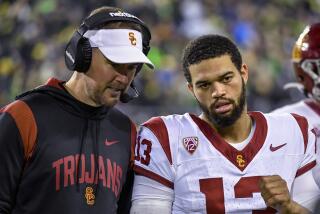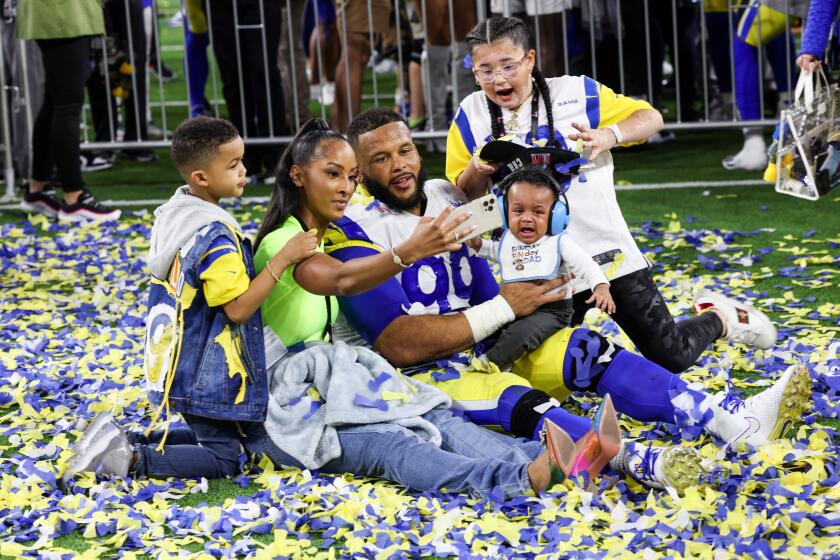COLLEGE FOOTBALL ’88 : TAKE-CHARGE GUYS : While Head Coaches Are Getting Most of the Attention, Assistants Are Doing a Majority of the Work
This is a small tribute to assistant coaches, the men behind the men. The guys who call the plays, watch the film and actually run practice. Anonymous workhorses. The shadow men who work the sidelines with mightily concealed egos. Guys who have to contain smirks when their boss, all blow-dried and be-blazered, tells the alums what he’s just cooked up for ol’ Central State.
Read no further if it’s your belief that the head football coaches dream up game plans, teach blocking techniques in the dirt and unspool film into the early hours. The head coach is a CEO, the closer when it comes to recruiting, a highly paid speechmaker during the season. A smoothie. But who did you think was drawing all those X’s and O’s when Coach was working the booster groups?
You still think it’s Coach. OK. Miami, our defending national champion, is perhaps the most extreme example we have of purely offensive, pro-style football. The Hurricanes have showcased the best passing games and the best quarterbacks year after year--Jim Kelly, Bernie Kosar and Vinny Testaverde. All talented, but products of a sophisticated offense, too. Such a system that when Steve Walsh, he of little arm, succeeds Testaverde, he also passes his team to a national title.
Did you ever wonder how Head Coach Jimmy Johnson sustained this wizardry. The same man who was an assistant defensive coach from 1965 to 1979?
Well, assistant coaches. Gary Stevens has been one for 22 seasons now, most recently at Miami, where he calls all the plays. He’s one of an elite corps across the country who are actually somewhat famous, a kind of guru, less anonymous than the average assistant coach. A couple of other vest-pocket geniuses of repute: Lynn Amadee at Florida and Homer Smith now at Alabama. You may know their names, but nowhere near as well as those of Galen Hall or Bill Curry, their bosses. Yet these are the guys who do the work.
“The coach has got alumni, players, athletic directors, parents and press to deal with,” said Amadee, who had developed the Texas A&M; offense before leaving for Florida this season. “He can’t be in there watching film. He’s got to look at us, say, ‘You’re the guys, go do it.’ ”
At Florida, Hall had been the offensive coordinator as well as head coach but, according to Amadee: “He felt like he was missing a little bit, wasn’t spending enough time, totally, with the players. He wanted to turn it over.”
Says Homer Smith, who is credited with helping Terry Donahue bring UCLA to an offensive prominence: “You just wouldn’t believe how outside stuff occupies a head coach. Here (at Alabama), it just dominates Bill’s time. Terry really has less going on outside to occupy him, but even so, there was not that much time.”
Gary Stevens: “A good coach delegates. They can’t be tied up with details. He has to have the overview and be able to understand if what you’re trying to do is sound. But he really doesn’t have time to study an opponent. I control the offense and I call the plays. And I’ve never been second-guessed.”
If these guys are so smart, so responsible--if these guys are practically head coaches--then why aren’t they head coaches somewhere? “I was, but I got fired,” said Homer Smith in his solemn way. All right, but, really, these fellows could get a job somewhere, they’re always getting offers.
“I hate to sound like an ass, but I’ve had opportunities to be a head coach, but not somewhere I’d have a chance to win,” Amadee said. “To be head coach for 2-3 years, go 2-9 and get fired, just to say you’ve had the title? Uh-uh. I want to be a head coach, that’s my ultimate goal. But I need a chance to win.”
Earlier in his career, Amadee was seduced by the notion that one needed head coaching experience to get a head coaching job. He was always bumping up against that in job interviews. So he left Johnny Majors at Tennessee in 1979 and grabbed a Division I-AA job in Tennessee. Program had no money, no resources, and Amadee went 5-6 and 6-5. “You don’t have to have that,” he said, and returned to the life of offensive guru.
Gary Stevens also gets offers, but not the right kind. “I’m very, very ambitious, and 99% of us want to be a head coach, and I’m the same way,” he said. “But just to take a job . . . I have a good job. I turned down a couple offers, just didn’t feel right. I want the opportunity to win.”
A longtime assistant who finally broke away, Iowa State Coach Jim Walden told the Sporting News: “Coaches have an aversion to leaving winning (teams). If you are an assistant at Nebraska, where is he going to go from there. If you’re an assistant, you say, ‘Where am I? My objective is to be one of two things: Either to be damn comfortable and winning and not be a threat to lose my job, or make a move to make myself better and be a head coach.’ Now, a lot of people say staying at a winning program is just as good as taking a chance and getting fired and still not getting to be a head coach.”
At Nebraska, where there is lots of winning and job security, the tenures are long. One assistant has been there 27 years, four others more than 10. At Oklahoma, seven have been assistants longer than a decade.
The Homer Smiths and Lynn Amadees have their pick of programs. Amadee watched his offense push Texas A&M; through three 9-2 seasons and then decided to make a career move. “If I really want to be a head coach, which is everybody’s goal, then I have to accept another challenge,” he said. “If I stayed at Texas A&M;, and for some reason things went bad, I’d lose my guru status. This way, if things turn around at Florida, it’s a feather in my cap.”
Amadee, who was rumored to be making more than $100,000 at Texas A&M;, admitted there were financial considerations, too. “We felt like we were getting paid pretty good,” he said, laughing. “And now we’re paid a little better.”
Homer Smith, who balks at the image of hired gun, left UCLA for the Kansas City Chiefs but was disappointed both in the NFL and himself. “In the NFL we won 4 games and lost 11,” he said. “I felt terrible. I didn’t get it done for him.” Smith hated the lack of coaching time in the NFL. “In college we practiced more. In the NFL, I’d look at film and we weren’t getting it right.”
Back in college he can now enjoy the autonomy of offensive coordinator. “If anything, I have more autonomy here,” he said. “And I like that. I have a job better than a lot of head coaching jobs--money, challenge, ego satisfaction. I loved being head coach, but I got fired. I’d love doing it again. But being an assistant coach pays the bills.”
In a way, these assistants have the best of both worlds. As Amadee says: “I came with complete control, could even hire my own guys. I can put over my offense totally. He lets me make my own decisions, run my own offense.” And yet they don’t have to do those bothersome things, like talk to the boosters or, of course, get fired.
Maybe the only thing is that they have to keep moving around. Smith says he “hates it for his wife,” but otherwise doesn’t mind traveling the country in search of a punchless program. “Why would I?” he says. “Wherever I go I’m part of the football world.”
More to Read
Go beyond the scoreboard
Get the latest on L.A.'s teams in the daily Sports Report newsletter.
You may occasionally receive promotional content from the Los Angeles Times.










